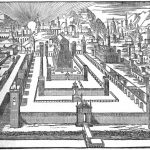No one captured the modern terrors of alienation and bureaucracy better than Franz Kafka, penning some of the 20th century’s best-known short stories. Yet family, religion, and Zionism also drew him, though all three remained unattainable dreams trapped in the prism of his short life
Franz Kafka was born in Prague in 1883 and died of tuberculosis at age forty-one. Although he published very little in his brief lifetime, Kafka became one of the most influential icons of 20th-century literature. British poet W. H. Auden even referred to “the Kafka century.” What was the secret of his unique literary style? How did he experience Judaism? And can he be considered a Jewish writer?
A Linguistic Triangle
Kafka was born in one of the most important cities in the sprawling Hapsburg Empire, in which twelve different nationalities intermingled. Austro-Hungary labored to keep them all in check, peddling an uninspiring mix of German culture and Austrian patriotism. Yet unrepressed, nationalist fervor erupted in several hot spots, including Prague, capital of Bohemia. Like most of central Europe’s big cities, Prague was German in language and culture until the mid-19thcentury, when urbanization brought an influx of Czechs from the surrounding small towns and rural areas. By the beginning of the 20th century, this contingent was the majority, and about half of those listed as Germans in the Austro-Hungarian censuses were in fact Jews.

How best to tell the story of this diverse population? Until recently, scholars depicted a constant struggle between Germans and Czechs vying for ascendancy, squabbling, for example, over whether city streets should be named in German or Czech. Stuck in the middle, the Jews were perceived as sitting on the fence, leading to increased anti-Semitism. Isolated, they took refuge in their own cultural expression, especially Zionism.
Today, however, the three ethnic groups are thought to have coexisted peaceably – even socializing with one another – apart from arguments blown out of proportion by politicians and restless university students. Some of Prague’s most prominent Zionists – including their leader (and Kafka’s classmate), philosopher Samuel Hugo Bergmann – saw this integration as their key contribution to the Zionist cause. The cultural ease inbred by their native city would, they thought, allow them to bridge other gaps – between Jew and Arab as well as between western and eastern European Jewish culture.
Either way, Kafka’s unique style can’t be fully grasped without appreciating his complex political and cultural environment. In the original German, for example, Kafka’s coherence differs markedly from the unwieldy sentences employed by his German contemporaries. This clarity stems at least partly from his being an outsider to the German-speaking community, but owes just as much to the linguistic sensitivity he developed by living in Prague’s ethnic jumble.








